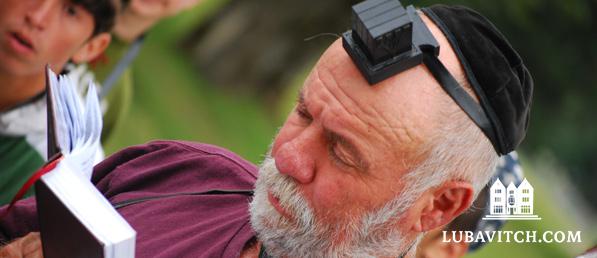(lubavitch.com) “What in the world are you doing here?”
The truth is, Michoel Harari barely knew himself. As director of Yeshiva Outdoor Adventure Camp, Rabbi Harari is used to finding himself beyond the beaten path, way beyond. But what brought him to this tiny park at the edge of Chilliwack, British Columbia was a quirky sequence of delays, changed plans, and U-turns. What he eventually found gave him a newfound appreciation for Divine Providence.
On this particular August morning, YOA’S 26 campers had planned to recite their morning prayers at the campsite Canada. When the manager told them they needed to vacate within 20 minutes, those plans were scrapped. Thankfully, says Harari, “it was two weeks into camp and the campers were very efficient at that point.”
Less than 15 minutes later, their tents and camping gear were ready to go. Driving down the dirt roads, Harari and the counselors conferred about finding a spot where the group could pray. Someone suggested a nearby park, but Harari decided to swing a quick U-turn and return to the scenic vista.
There, the campers set up shop, unpacked their Tefillin, and prepared to pray. That’s when Moshe walked out of the woods. The gentleman, an Israeli, was on his daily (doctor-prescribed) hike.
It was the first day of the Hebrew month of Elul, and Moshe’s father’s yahrtzeit. The night before, as he lit his memorial candle, Moshe mourned the fact that he wouldn’t be able to say kaddish for his father. Lacking the necessary quorum of ten men, he had never recited the prayer for his late father.
But that morning, he did. He also had an aliyah and put on Tefillin. Since moving to this remote Canadian town 26 years ago, Moshe has not seen another Jew. According to camper Abie Daphna, “he told us that he had left Israel to escape his Jewish roots. “
“I can’t say the campers were shocked by the encounter,” acknowledges Harari. “By this point in the summer, things like this were normal.”
Indeed, over the course of the summer, campers encountered Jews on sailboats and in the mountains. In Great Falls, Montana, Harari bumped into the only local Jewish family. (They recognized him because of his distinctive yarmulke.) The mother told him they had been trying to get in touch with YOA for three years, going so far as tracking their annual itineraries, because they were so impressed with the camp.
Though it is a touring camp (YOA visited Montana, Canada, and Washington) “traveling is not a means to an end,” insists Harari. “Our emphasis is on experiential education.” Beyond the interesting encounters and beautiful views, campers ended the summer as certified able-bodied sailors and were trained in bear and food safety, orienteering, search and rescue, water treatment, and weather determination.
Impressions last well after the last tent is packed away and the sunburns have begun to fade. In particular, Harari believes experiences that highlight Divine Providence stays with the campers.
“The Lubavitcher Rebbe taught us that wherever someone is, he is there for a reason. It is all because of G-d’s intricate planning. The knowledge helps on a practical basis as well,” continues Harari. “When something goes wrong for a kid in school or he misses his train, he stops to think, ‘hey I wonder why this happened to me.’ It’s inspirational.”
Abie Daphna, 17, loved meeting Jews on the run, and actively searching them out at various campsites and trails. Though he admits he is a little “scared to be an ambassador for Judaism,” he is also “very, very proud.” The veteran camper says, “When strangers see us, they may be a little intimidated, but then they realize that Orthodox Jews are really not that different, not bad.
Daphna believes that being an ambassador is a privilege and also a responsibility. Daphna was born after his parents spent seven years trying to have children. They experimented with “all these wacky things like drinking special water in Paris and touching the belly of Buddha,” until a friend convinced them to try a different tack. He persuaded the couple to ask the Lubavitcher Rebbe for a blessing. They did, and the Rebbe blessed them to have children and gave Mrs. Daphna three dollar bills. Nine months later, their triplets, Abie and his brother and sister, were born.
“I am honored to be doing this,” Daphna says today. “By bringing Judaism to the wild, I am chipping away at what I owe the Rebbe. I am slowly doing what I can, but really, I am only scratching the surface.”

Be the first to write a comment.